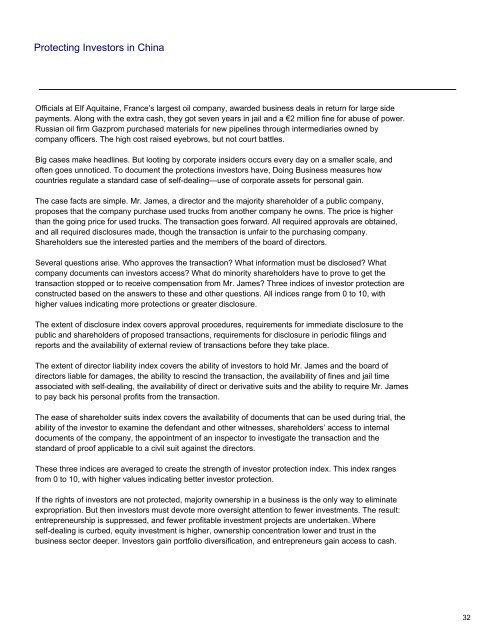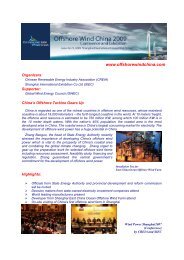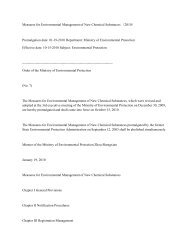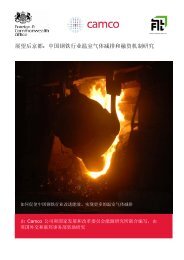View full report - NEEC
View full report - NEEC
View full report - NEEC
- No tags were found...
Create successful ePaper yourself
Turn your PDF publications into a flip-book with our unique Google optimized e-Paper software.
Protecting Investors in ChinaOfficials at Elf Aquitaine, France’s largest oil company, awarded business deals in return for large sidepayments. Along with the extra cash, they got seven years in jail and a €2 million fine for abuse of power.Russian oil firm Gazprom purchased materials for new pipelines through intermediaries owned bycompany officers. The high cost raised eyebrows, but not court battles.Big cases make headlines. But looting by corporate insiders occurs every day on a smaller scale, andoften goes unnoticed. To document the protections investors have, Doing Business measures howcountries regulate a standard case of self-dealing—use of corporate assets for personal gain.The case facts are simple. Mr. James, a director and the majority shareholder of a public company,proposes that the company purchase used trucks from another company he owns. The price is higherthan the going price for used trucks. The transaction goes forward. All required approvals are obtained,and all required disclosures made, though the transaction is unfair to the purchasing company.Shareholders sue the interested parties and the members of the board of directors.Several questions arise. Who approves the transaction? What information must be disclosed? Whatcompany documents can investors access? What do minority shareholders have to prove to get thetransaction stopped or to receive compensation from Mr. James? Three indices of investor protection areconstructed based on the answers to these and other questions. All indices range from 0 to 10, withhigher values indicating more protections or greater disclosure.The extent of disclosure index covers approval procedures, requirements for immediate disclosure to thepublic and shareholders of proposed transactions, requirements for disclosure in periodic filings and<strong>report</strong>s and the availability of external review of transactions before they take place.The extent of director liability index covers the ability of investors to hold Mr. James and the board ofdirectors liable for damages, the ability to rescind the transaction, the availability of fines and jail timeassociated with self-dealing, the availability of direct or derivative suits and the ability to require Mr. Jamesto pay back his personal profits from the transaction.The ease of shareholder suits index covers the availability of documents that can be used during trial, theability of the investor to examine the defendant and other witnesses, shareholders’ access to internaldocuments of the company, the appointment of an inspector to investigate the transaction and thestandard of proof applicable to a civil suit against the directors.These three indices are averaged to create the strength of investor protection index. This index rangesfrom 0 to 10, with higher values indicating better investor protection.If the rights of investors are not protected, majority ownership in a business is the only way to eliminateexpropriation. But then investors must devote more oversight attention to fewer investments. The result:entrepreneurship is suppressed, and fewer profitable investment projects are undertaken. Whereself-dealing is curbed, equity investment is higher, ownership concentration lower and trust in thebusiness sector deeper. Investors gain portfolio diversification, and entrepreneurs gain access to cash.32











